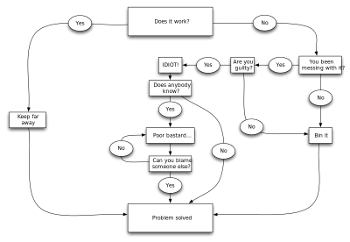Pausing to determine where you’ve come from and why you are where you are can be a valuable exercise in knowing where you want to go, as well as in understanding the value you can provide. An exploration of my past dozen consulting years taught me that taking an occasional break from consulting has improved my ability to better understand and help subsequent customers.

In 1998, after over 15 years of professional development, I thought I’d be Mr.-Retire-From-Big-Corporation-With-Nice-Pension. In 1998, I had just reached my five-year mark with MCI. When WorldCom came around seeking souls to connect to the hive mind, my research determined that they didn’t provide such a hot place to work. I was in the 1% of shareholders who voted against it. Sometimes being right isn’t gratifying (what a debacle).
I moved on to a local dot-com, the now-defunct ChannelPoint. In 1999, I learned about XP** and did what of it I could–mostly some TDD–while isolated as a professional services developer in my shared office. Cool stuff!
In 2000, with ChannelPoint’s collapse pending, I excitedly began my foray into the world of consulting. I worked proudly for Object Mentor for two years. I then joined an XP team and enjoyed pair-programming day-to-day as “just another developer” for seven months.
An important revelation hit me: Promoting XP as a consultant and practicing XP as a team member are two completely different things. I’d preached about a few things–pairing, most significantly–that I’d done only as an external party, not as a true team member. Until you experience what pairing is like, day-in day-out for an extended period of time, you can’t possibly understand what it really feels like. And pairing felt good, but I also learned to recognize some problems with it.
I knew I had gathered very relevant information, and started consulting on my own. Cool! Well, the wife didn’t think so; she preferred me home. In 2004, I took on a local position again as a developer, and ended up a developer/manager for the better part of a year. I learned a lot more about what makes teams excel–I had a kick-ass development team, and they weren’t even doing much in an XP sense.
The call of consulting took me again on the road to help other teams learn what I’d learned. I transitioned to being an internal consultant at a large shop pushing the mandate of Thou Shalt All Be Agile All At Once (it doesn’t work, believe me). I started feeling out of touch, and the unending barriers presented by a rigid corporate structure made things all the more frustrating.
I returned to development as a remote programmer for GeoLearning for most of 2010. More learning about what works and what doesn’t! After GeoLearning was bought out and all remote individuals terminated, and after a local 3-month “just a developer” contract, I figured it was time to spread words again.
(The sneaky part: Employee vacation time over the years provided an opportunity to take on short training and consulting engagements here and there, largely to give me a fix for my books and training addictions.)
I’ve been back in full consulting swing for about 15 months. I wonder when that will need to end again. Yes, I could remain a full-time consultant and still provide good value for my customers. But I’ve found I can be even better by finding a way to occasionally immerse in a development team, to remain current, open-minded, and relevant.
** Extreme Programming. That’s for you, J.B. It’s not dead yet.
Comments
Pingback: Langr Software Solutions » The Consulting Legitimacy Cycle: 4+ years to 2 weeks

